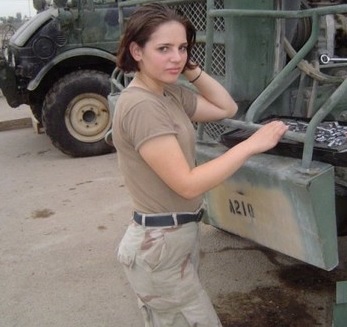
I read in the news today that U.S. military Army Secretary, John McHugh, said earlier this week that there is a likelihood that women will eventually have to register for the draft in order for “true and pure equality” is to be realized.
This is one of those situations where it doesn’t feel good to say “I told you so”. But I predicted this three years ago in my Salvo article ‘Mixed Companies: Women in Combat, Feminism & Misogyny.’ Thankfully, this particular Salvo article is available online so you don’t even have to subscribe to our wonderful magazine to read it. (Still, we strongly encourage you to subscribe so you can read all the other excellent articles.)
My article looked at the reasoning behind the decision in January 2013 to allow women to serve in combat positions. I argued that in its quest to become politically correct the military had neglected to give insufficient consideration to the implications of, so called, “gender neutrality.” I went on to raise concern that the principle behind the decision could eventually entail drafting females into combat positions. I wrote:
In 1973 the United States discontinued the draft, moving to an all-volunteer military force. Nevertheless, a law signed by President Carter requires every man to register with the Selective Service System when he turns eighteen. This enables the government to know who will be available should a draft ever be needed. If the United States were to find it necessary to call a draft in the future, it would likely differ from all previous drafts in that the military might not merely be seeking man-power, but also woman-power.
Tommy Sears, executive director at the Center for Military Readiness, told Fox News that the changes announced last January could obligate the U.S. government to draft females into combat roles, should the draft ever be reactivated. “Once you allow women into combat, you are then essentially ordering all women to fight,” he said. “There are interest groups for women who will actually make it a point to see that that happens.”
When asked about these possible ramifications, Leon Panetta, Secretary of Defense at the time, didn’t rule out females being drafted for combat roles, but simply replied, “That’s not our operation.” He went on to say, “I don’t know who the hell controls Selective Services if you want to know the truth. . . . Whoever does, they’re going to have to exercise some judgment based on what we just did….
“Now perhaps the United States will never need to call another draft, and this will be a moot point. But if (God forbid) the country ever does find itself in the position of needing to conscript citizens into military service, the philosophical and political framework for drafting girls as young as 18 into combat roles will already be in place.”
My article went on to explore some of the practical and social disasters that could arise if women were ever drafted into the military. I ended by reflecting on the more philosophical issues behind the decision to allow women in combat positions (and in the process, to open the possibility of women being drafted into combat positions in the case of another major war).
“The principles behind the move to allow women into combat roles hinge on some of the same assumptions held by misogynist societies that cruelly subjugate females. Individuals and societies that are abusive towards women typically assume that a woman’s significance is determined by her role. In such contexts, a woman’s value is determined by what she does, not who she is.
“Those who believe that women have been victims of the military’s sexist policies also typically assume that a woman’s worth is determined by what she is able to do, as well as by where she is situated in the social strata. According to this mindset, women’s worth has been marginalized by military policies that, until last January, discriminated against would-be female combatants.
“But this mindset is just as wrongheaded as that found in misogynist cultures. Whether a woman’s role is characterized by subjugation (as in misogynist societies) or by the lack of any gender-specific boundaries (as in societies tinctured by feminism), it is regarded as the basis for determining her personal worth. Both systems wrongly insist that personal role is correlated to personal worth…
“If women are eventually drafted into combat positions, will this be the ultimate triumph of male domination or of feminism? It’s hard to say. But the reason it’s hard to say is that this is one of those topsy-turvy situations in which those who want to protect women from the horrors of battle (and from possible sexual exploitation if they are captured) get accused of being anti-woman.
“Just as the feminist community has never been able to reach a consensus on whether pornography is denigrating or empowering to women, it appears that feminists are also divided on whether it will be liberating or empowering to force American girls into the line of enemy fire in the event of another draft. Actually, that’s looking at the matter optimistically. The worst-case scenario is just as likely: that there will be no cogitation on the question at all, and the whole feminist community will simply embrace the “empowerment” of a gender-neutral draft as unthinkingly as they have embraced the recent decision to allow girls and women onto the battlefield. God help us if it comes to that.” (To read my entire article, click here.)
To may have come to this sooner than I anticipated. Here is what the Military.Com website wrote earlier this week.
McHugh said draft registration was not a subject to be decided by the services or the Department of Defense, and will ultimately have to be dealt with by Congress. He expected a “pretty emotional debate and discussion.”
However, as more military occupational specialties are opened to women, the debate on Selective Service System registration was inevitable, McHugh said. “If we find ourselves as a military writ large where men and women have equal opportunity, as I believe we should,” he said.
The question on women and the draft was posed to McHugh and Gen. Mark Milley, the new Army chief of staff, at the annual three-day meeting and exposition of the Association of the U.S. Army at the Walter E. Washington convention center in Washington, D.C. Milley deferred the question to McHugh, saying he could not comment on policy.
The subject of women registering for the draft was a topic of debate at an Aspen National Security forum in Colorado this summer.
In one panel discussion, retired Navy Adm. Eric Olson, former commander of the SEALs and the Special Operations Command, said that women should have to register for the draft if they also can serve in combat.
On a separate panel, Air Force Secretary Deborah James said that she would have no problem with women registering for the draft.
Defense Secretary Ashton Carter was to decide in January on whether combat roles, mostly in the infantry, armor, artillery and Special Operations, should be opened to women.
Further Reading


